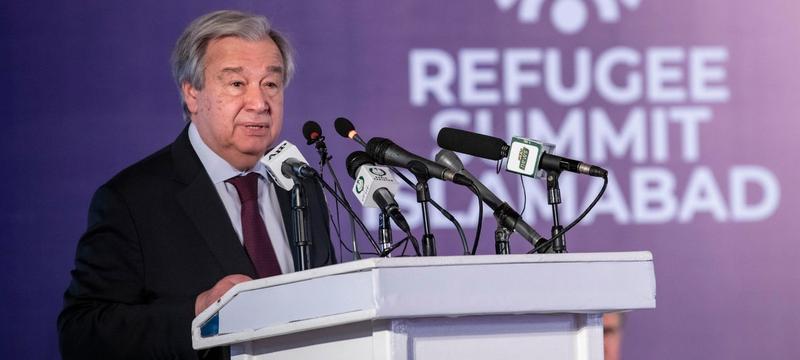 UN Secretary-General António Guterres addresses the International Conference on 40 Years of Hosting Afghan Refugees, in Islamabad, Pakistan on Feb 17, 2020. (MARK GARTEN/ COURTESY OF UN.ORG)
UN Secretary-General António Guterres addresses the International Conference on 40 Years of Hosting Afghan Refugees, in Islamabad, Pakistan on Feb 17, 2020. (MARK GARTEN/ COURTESY OF UN.ORG)
ISLAMABAD - United Nations Secretary General Antonio Guterres has called upon the world to recognize Pakistan’s generosity and efforts in hosting Afghan refugees despite the fact the country received “limited support from the international community”.
Millions of registered and undocumented people have fled neighboring Afghanistan into Pakistan since their country was invaded by the Soviet Union in 1979
He made the remark while addressing an international conference titled “40 Years of Hosting Afghan Refugees in Pakistan”, a two-day event which concluded Tuesday in the capital city Islamabad.
The UN chief is on a four-day visit to the country. Besides attending the international moot on Afghan refugees, he also held meetings with officials and visited Kartarpura Corridor, and appreciated Pakistan’s contribution to UN peacekeeping endeavors.
ALSO READ: Pakistan, Afghanistan hold talks on refugees' repatriation
While addressing the inaugural session of the conference on Monday, Guterres viewed that the world support to Pakistan did not match the country’s efforts to shelter and feed millions of Afghan refugees for the last four decades.
He said despite its own challenges, Pakistan has sheltered and protected Afghan refugees and time has come the world should acknowledge its efforts in this regard.
He called on the international community to support Pakistan and show similar leadership in handling refugee flows across the world.
Millions of registered and undocumented people have fled neighboring Afghanistan into Pakistan since their country was invaded by the Soviet Union in 1979. During the later days more refugees arrived due to conflicts between warring factions in the Taliban regime and later because of the United States-led military operations.
Many of these refugees and their families are living in camps in the areas of Khyber Pakhtunkhwa (KP) adjacent to Afghanistan while others have shifted to bigger cities like Karachi and Peshawar and Quetta and even Lahore and settled there, establishing small and medium businesses.
It is estimated that Pakistan provided refuge to around 4.5 million Afghans at the peak of the conflict. A number of the refugees returned to their homeland, but about 2.7 million others still live in Pakistan.
Support for Afghan refugees has declined over the years because of donors fatiguing with the conflict that is in its 19th year and Kabul’s failure to reform governance
Guterres said it was a unique occasion to commemorate the four decades of Afghan refugees’ presence in Pakistan, one of the oldest refugee crises in the world. The occasion coincided with the progress in peace negotiations between the United States and the Afghan Taliban.
He also asked the international community to contribute to meeting the refugee needs and creating enabling conditions for their repatriation and reintegration in Afghanistan.
“We need a renewed commitment,” he said while calling for complementing peace efforts with reconstruction and creating conditions for return and reintegration of refugees. He urged “greater responsibility sharing” with Pakistan and Iran that have played host to Afghan refugees, emphasizing that “Afghanistan and its people cannot be abandoned”.
He said the message from the conference was building new partnerships and renewing solidarity with Afghan refugees.
Support for Afghan refugees has declined over the years because of donors fatiguing with the conflict that is in its 19th year and Kabul’s failure to reform governance.
Moreover, the number of refugees returning to Afghanistan is at a historic low and Afghans now constitute the largest group of refugees reaching Europe, overtaking the Syrians often through dangerous routes using unsafe means of transportation.
While welcoming the UN Secretary General on his maiden tour to Pakistan, Prime Minister Imran Khan said Pakistan overcame challenges of meagre resources to host the refugees. He also recalled Pakistan’s support for peace efforts in Afghanistan. “There is a consensus within Pakistan for peace in Afghanistan,” he said while referring to perceptions about divergence on the issue among Pakistani institutions.
He also rejected the Afghan government’s allegations about militant safe havens in Pakistan from where they allegedly carried out violence in Afghanistan.
Prime Minister Khan said, “Be rest assured that it is not in our interest that violence continues.” He emphasized on developing trade and connectivity and noted that it was not possible without peace.
Pakistan’s Foreign Minister Shah Mehmood Qureshi at the conference proposed a seven-point action plan for activation of the recently established ‘Support Platform for the Solutions Strategy for Afghan Refugees’.
The proposed action plan called for supporting Afghan peace process; renewing pledges and commitments for meeting refugees requirements; forging new partnerships and reinforcing older ones for fulfilling the responsibility towards refugees; extending and enhancing resettlement opportunities in third countries; provision of resources to host countries for offering additional scholarships, and imparting employment skills; enhancing assistance for improving living conditions in Afghanistan; and creating an international fund for helping return of refugees and creating economic opportunities in host countries.
READ MORE: Afghan women refugees resurrected as India's plastic waste warriors
UN High Commissioner for Refugees Filippo Grandi appealed to the donors to provide aid through the Support Platform for Afghan refugees, which was set up at the Global Refugee Forum in December 2019.
“Hosting refugees is a responsibility, exercised on behalf of the international community – a responsibility that, we must recognize, has not been equitably shared. … international support, while welcome, remains woefully insufficient,” said Grandi.


